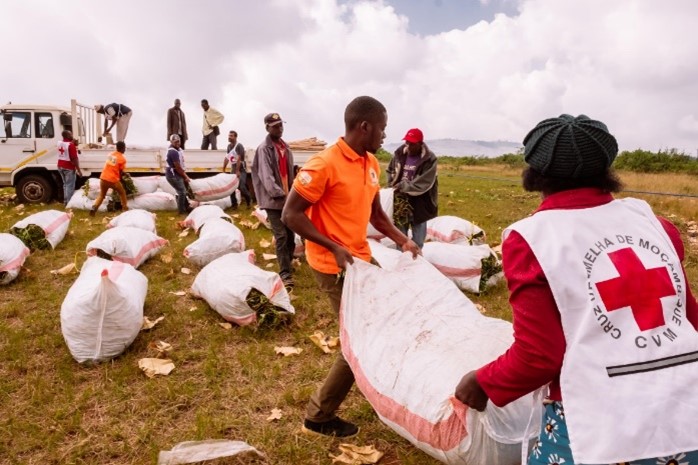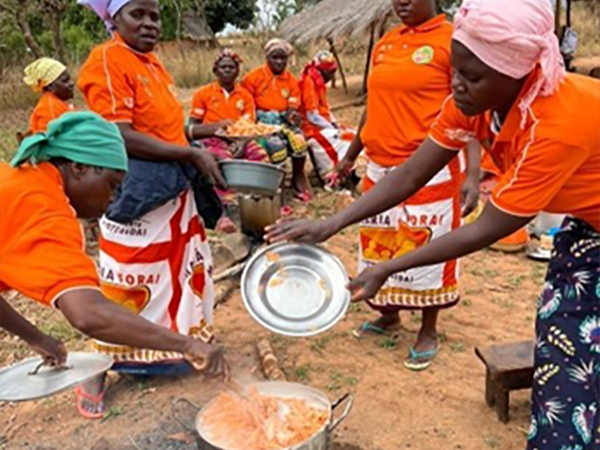Mozambique is a Sub-Saharan African country prone to recurrent cyclones, floods, and droughts.
Most people affected by this extreme weather are poor farmers, depending solely on agriculture for their livelihoods. The aftermath of these events usually results in complete harvest losses, leaving farmers solely dependent on humanitarian assistance for their immediate needs, especially food items for their survival.
To remedy this, The Government of Mozambique (GOM) and its partners have adopted a holistic approach to mitigating and adapting to these climate change-related events. Partners from the agriculture, nutrition, and emergency relief sectors came together to alleviate the effects and improve the livelihoods of the more than 1 million people affected by six recent major climate-related events, including the cyclones Idai and Chalane that affected the Mozambican provinces of Manica and Sofala over the last 10 years.
The use of resilient crops and agriculture practices play a key role in the process of rapid recovery, and sweetpotato has been crucial, providing edible vegetables (leaves) in a very short time (less than one month) and caloric and nutritious storage roots after 3-4 months of planting.
The International Potato Center (CIP) and partners have been on the frontline working with government and civil society organizations in the relief and post-relief efforts to mitigate the effects of these climate change-related events. Early in March 2019, just after Cyclone Idai hit the province of Manica and Sofala, CIP and the International Federation of the Red Cross and Red Crescent Societies (IFRC) partnered to provide the first relief kits (Photo 1) (including sweetpotato seeds, farming tools and inputs) to 10,000 farmers.
About 40 tons of sweetpotato planting materials were distributed to 10,000 families affected by Cyclone Idai in Manica and Sofala provinces. Sweetpotato planting materials were part of the key components of the kits distributed for emergency relief in Manica and Sofala province 10 days after the disaster occurred.
A joint collaboration between CIP and Red Cross. Assembling and distributing sweetpotato planting materials and farming tools/inputs to farmers affected by the Cyclone Idai in Mossurize District, Manica province. This work was conducted in collaboration with IFRC in June 2019 (Credit: Isabel Ghothier).
However, according to UNICEF and WFP, more than 1.5 million households lost their first planting of the season as a result of Cyclone Idai. The distribution of sweetpotato planting material in the affected areas as part of the relief package was followed by a climate change adaptation program funded by the USAID/Bureau for Humanitarian Assistance (BHA) that included developing a sustainable seed system, nutrition education, and marketing.
The program reached 40,906 direct beneficiaries, each with 8 kg of sweetpotato planting materials that were planted on a total area of 1,636 ha in Manica (953 ha) and Sofala (683 ha) with improved orange-fleshed sweetpotato (OFSP) and purple-fleshed sweetpotato (PFSP) varieties. As part of the mechanism to build resilience, a total of 34,453 (79% female) direct beneficiary households in Sofala (19,983 HH) and Manica (14,470 HH) received technical assistance and capacity building on sweetpotato agronomy and conservation of planting material. At least 20,000 families (80% women) directly received nutrition and health-related messaging and food processing demonstrations during program implementation.
During the nutrition training (Photo 2), most farmers tended to link these nutrition education and food processing activities with their production and marketing-related activities. Clearly, most of these participants are more likely to increase their production areas while creating awareness of marketing opportunities in their villages.
“After Idai, CIP was the very first organization to bring us seeds, and the first to implement the seed system, nutrition education and food processing demonstrations in our community,” said community health agent (APE) Mr. Tomas Francisco Moises from Metuchira, Nhamatanda district in Sofala province “Myself as APE, I will continue training and pass on most of the knowledge acquired during the training and interactions conducted by CIP and the Nutritionist of the ‘’Saude’’-local health authorities. Also, my wife and I are planning to increase our production area to sell the vines and roots to other neighborhoods and along the Beira Corridor”.
Farmers with sweetpotato nutrition and health leaflet after their participation in one of the nutrition education and food processing sessions in Metuchita resettlement center in Nhamantanda, Sofala province, September 2022 (Photo: C. Saveca- Nutritionist Consultant)
Inspired by the impact of the initiative, the GOM has recommended using sweetpotato as a key crop in the immediate emergency response, as well as for building sustainable and climate-resilient agricultural and food systems. The crop is regarded as crucial to support the GOM national multi-sectoral plan to combat under-nutrition (PAMRDC) through Objective 4, which is to “strengthen activities aimed at family for the improvement of access and use of foods with high nutritious value”.
In an official note sent to CIP during the close out of the interventions under Idai in Manica province, the Government of Manica Province, through the Note: 786/620/DS/2021 said, ‘’We recognize the excellent partnership between the Government and CIP, and we reiterate and acknowledge the good work CIP is leading and implementing in the districts of Mossurize, Sussundenga, Gondola, Manica, Vanduzi, in relation to the multiplication and distribution of planting material, nutrition education and food processing demonstrations with significant impact to revert the prevalent high chronic malnutrition (42%), and acute malnutrition (6%) in the province. Because of that, the Government highly recommends the continuation and expansion of this work to other districts in the province.’’
According to Abdul Naico, CIP Country Manager, “humanitarians work under extraordinary conditions to reach and assist populations affected by cyclones and floods. We as CIP are proud to be associated with efforts to support and strengthen resilience by bridging short-term responses for seed relief with approaches for the long-term sustainability of seed systems.”
This activity was made possible through support provided by the U.S. Agency for International Development, under the terms of Award No. AID-BFS-IO-17-00005 / MTO 069033 Amd. No. 8 (through CGIAR) The opinions expressed in this event are those of the authors and do not necessarily reflect the views of the US Agency for International Development.


